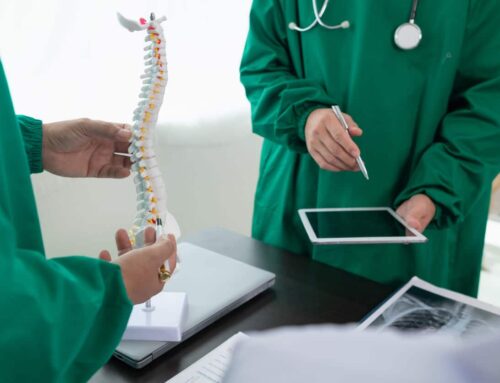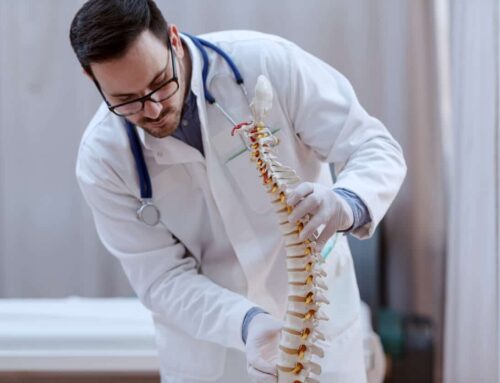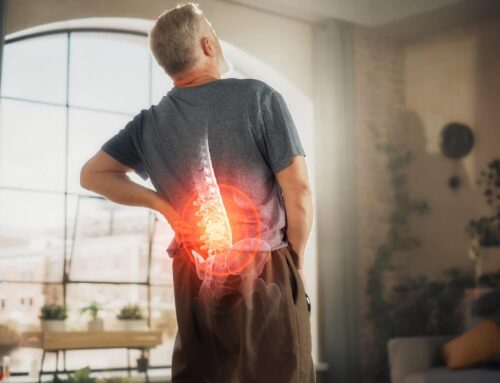Headaches can interfere with our daily lives, affecting productivity and overall well-being. While there are various causes of headaches, one lesser-known reason is due to issues relating to orthopaedic trauma or disease. In this blog post, learn about cervicogenic headaches and other orthopaedic conditions that can cause headaches.
Orthopaedic conditions are issues of the musculoskeletal system, which includes bones, joints, muscles, ligaments and tendons. These conditions can cause pain and discomfort in different parts of the body, including the shoulders, neck and head. Orthopaedic conditions that can contribute to these types of headaches include:
Cervical spondylosis
Cervical spondylosis is a degenerative condition that affects the cervical spine. It is commonly known as arthritis of the neck. Changes can occur because of wear and tear of the spinal discs and joints, leading to pain, stiffness and limited mobility. When the nerves in the neck become irritated or compressed, it can result in headaches.
Temporomandibular joint disorders
The temporomandibular joint, or TMJ, allows the jaw to move when we speak or chew. TMJ disorders can cause pain in the jaw joint that can spread to the temples and cause tension headaches. TMJ pain can be caused by teeth grinding, injury to the jaw or arthritis.
Whiplash
Whiplash occurs due to a sudden and forceful back-and-forth movement of the neck. It most commonly happens in car accidents or due to sports injuries. The trauma strains the neck muscles, ligaments and tendons and leads to pain that radiates from the neck to the head. It is generally felt up to 24 hours after an injury.
Cervicogenic headaches
A cervicogenic headache – also known as a cervical headache – is caused by an orthopaedic condition in another part of the body. In most cases, it stems from a disorder of the spine, bone, discs or soft tissue in the back or neck. It can include tumors or fractures in the upper spine area.
A cervicogenic headache does not apply to all pain associated with neck strains or tension. It is not the same as a migraine, which is generally caused by a neurological issue or environmental trigger.
Common symptoms of a cervicogenic headache include:
- Pain on one side, starting in the neck and radiating to the back of the head, temples or behind the eyes
- Neck pain and stiffness, including worsening pain when moving the neck or applying pressure in certain areas
- Restricted range of motion in the neck and shoulders
- Pain triggered by certain activities or movements, like prolonged sitting, neck rotation or tilting the head backward
Treatment options
When dealing with an orthopaedic condition that causes headaches, it is important to see a doctor. Diagnosing the underlying cause can help your doctor develop an appropriate treatment plan.
Sometimes, lifestyle changes or at-home remedies may help alleviate the pain. When a chronic orthopaedic condition causes headaches, your doctor may recommend physical therapy or injection therapy.
Here is a closer look at a few options to treat cervicogenic headaches and other headaches relating to orthopaedic issues.
Lifestyle changes
Making lifestyle changes can help manage and prevent headaches related to orthopaedic conditions. This includes maintaining good posture and taking regular breaks during prolonged sitting or repetitive movements in the workplace.
You may also need to avoid or reduce activities that strain the neck or shoulders to prevent triggering a headache.
Physical therapy
Physical therapy is not just for rehabilitation. Learning proper techniques to address spine issues can improve mobility, flexibility and relieve pain. Physical therapy techniques that may help with cervicogenic headaches include:
- Therapeutic exercise to improve functional abilities
- Manual therapy to apply pressure to affected areas for pain relief
- Kinesio taping to stabilize joints and help with healing
- Graston technique to address painful areas with tools
- Dry needling to treat tissue pain
Medications
Nonsteroidal anti-inflammatory drugs may help to alleviate pain and reduce inflammation if headaches are infrequent. However, medications alone are typically not a long-term solution and are often used along with other treatments.
Anti-inflammatory injections may be recommended to reduce inflammation in the shoulder or spine area, which can provide relief from headaches. Other injections, such as platelet-rich plasma or stem cells, can treat degenerative issues that cause headaches.
Cervicogenic headache treatment in Raleigh and Cary
Do you have constant headaches and suffer from neck or back pain? Schedule an appointment with Cary Ortho Spine Center to discuss your symptoms. Our expert team can determine if the cause of your headaches is related to an orthopaedic condition.






